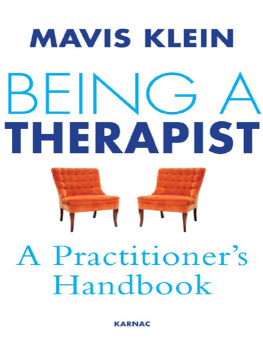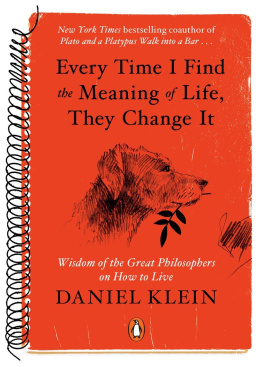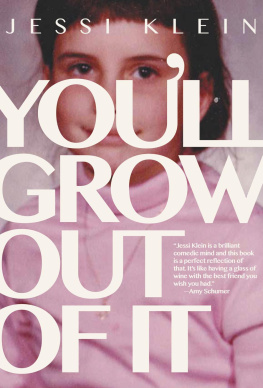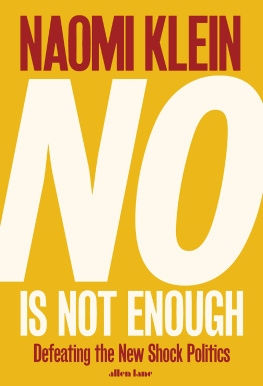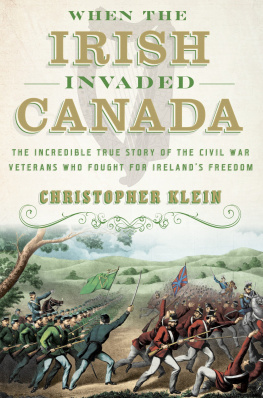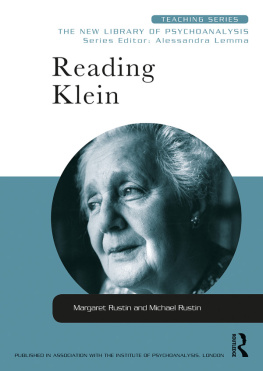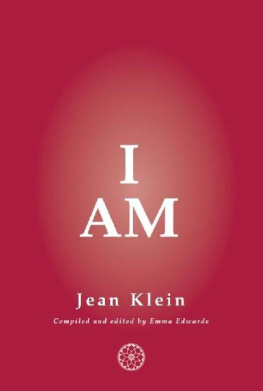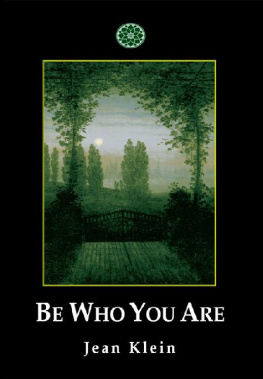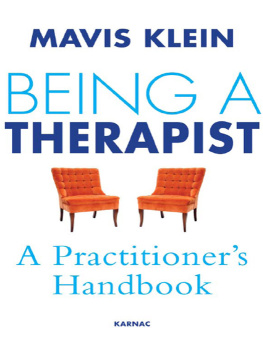Klein - Being a Therapist
Here you can read online Klein - Being a Therapist full text of the book (entire story) in english for free. Download pdf and epub, get meaning, cover and reviews about this ebook. year: 1980, publisher: Karnac Books, genre: Home and family. Description of the work, (preface) as well as reviews are available. Best literature library LitArk.com created for fans of good reading and offers a wide selection of genres:
Romance novel
Science fiction
Adventure
Detective
Science
History
Home and family
Prose
Art
Politics
Computer
Non-fiction
Religion
Business
Children
Humor
Choose a favorite category and find really read worthwhile books. Enjoy immersion in the world of imagination, feel the emotions of the characters or learn something new for yourself, make an fascinating discovery.
- Book:Being a Therapist
- Author:
- Publisher:Karnac Books
- Genre:
- Year:1980
- Rating:4 / 5
- Favourites:Add to favourites
- Your mark:
- 80
- 1
- 2
- 3
- 4
- 5
Being a Therapist: summary, description and annotation
We offer to read an annotation, description, summary or preface (depends on what the author of the book "Being a Therapist" wrote himself). If you haven't found the necessary information about the book — write in the comments, we will try to find it.
Being a Therapist — read online for free the complete book (whole text) full work
Below is the text of the book, divided by pages. System saving the place of the last page read, allows you to conveniently read the book "Being a Therapist" online for free, without having to search again every time where you left off. Put a bookmark, and you can go to the page where you finished reading at any time.
Font size:
Interval:
Bookmark:
First published in 2012 by
Karnac Books Ltd
118 Finchley Road
London NW3 5HT
Copyright 2012 by Mavis Klein
The right of Mavis Klein to be identified as the author of this work has been asserted in accordance with 77 and 78 of the Copyright Design and Patents Act 1988.
All rights reserved. No part of this publication may be reproduced, stored in a retrieval system, or transmitted, in any form or by any means, electronic, mechanical, photocopying, recording, or otherwise, without the prior written permission of the publisher.
British Library Cataloguing in Publication Data
A C.I.P. for this book is available from the British Library
ISBN-13: 978-1-78049-019-9
Typeset by Vikatan Publishing Solutions (P) Ltd., Chennai, India
Printed in Great Britain
www.karnacbooks.com
This book is dedicated with gratitude to the many
people who have trusted me with their realities
and have so enabled me to enlarge my own
Mavis Klein has been a psychotherapist for the past thirty-five years. She is a founder member of the Institute of Transactional Analysis and of the European Association for Transactional Analysis. She is a team-building consultant to many organisations and businesses both in the UK and overseas, and gives lectures and conducts training workshops for executives. She is the author of eight previous books on psychological topics. She is also a qualified astrologer.
There are as many kinds of psychotherapy as there are therapists. From a clients point of view, one therapy or therapist may be greatly different from another; but from a therapists point of view, there is much that he or she has in common with all other therapists. This book is about being a therapist from the therapists point of view.
Mind and body are increasingly understood to be a unity, and there are many therapies today that address our psychological as well as our bodily diseases through physical means. Nevertheless, in this book my presumption is that the therapist/counsellor is offering healing essentially through a verbal exchange, and my observations will be within that frame of reference, although I am confident that even the most physically oriented therapist will also find many of the ideas in this book relevant to his or her practice.
In writing this book, I have especially wanted to encourage advanced students and beginner practitioners to be confidently themselves in their interactions with their clients, notwithstanding all the rules and regulations that beset them and all the academic input they have received, which can seem so abstract and sterile in the reality of a face-to-face encounter with a human being in distress.
In a world where, increasingly, the customer is always right and professionals of all kinds are made to account for and justify their authority, I feel there is a crying need to redress the balance in a treatise that emphasises the wellbeing of the practitioner rather than the client. To this extent, I hope this book will also hearten experienced practitioners who are fed up and demoralised by the politically correct, bureaucratised constraints that so confine them today.
This book is non-academic and virtually jargon free; it is personal and anecdotal. It discriminates clearly between the responsibilities, cognitive understanding, and the feelings of the practitioner, and it is intended to be useful to all humanistic therapists and counsellors irrespective of their particular theoretical orientation.
Zeitgeist elaborates the existential issues that beset all human beings in contemporary Western society. Irrespective of the personal problems that our clients seek our help in overcoming, we share with them the pervasive stresses of post-modernism, which is the context that affects the particularities of all our lives. We and our clients benefit from sharing our awareness of the issues that we grapple with collectively.
Believing is about professionalism in its responsibilities and privileges. I hope this chapter in particular will support the reader in the expression of his or her self-confident authority in his or her relationship to his or her clients, which is the single most important characteristic that distinguishes the effectively potent therapist.
Thinking is about the substantive knowledge that enables the therapist to do the job of helping the client to solve his or her problems. It analyses the assumptions that underlie all humanistic theories and therapies and the samenesses and differences between individuals that need to inform the dialogues we have with our clients.
Five personality types is an outline of my own original theory of psychological health and pathology, developed inductively over twenty-five years of my clinical practice. It is in no way meant to compete with readers own confidently established theoretical frames of reference, but I hope it will nonetheless be of interest and possibly provide an extra string to the bow of the practitioner.
Feeling is about the emotional satisfactions and tribulations associated with being a therapist. It is intended to encourage the reader to a shame-free understanding of his or her own hang-ups and the value they have in the joyfully creative work of being a therapist.
Implicitly, if not explicitly, the profession of psychotherapy is deeply philosophical, dealing as it does with human nature. So I ask for the readers indulgence, in the name of rational comprehensiveness, before beginning my main theme, to make explicit the chief timeless issues that underpin all our theories and practice.
Whether or not there has been or can be progress in matters pertaining to human nature is debatable. Civilisation is the usual name given to the structures of society that aim to increase the average overall happiness of the world. But these structures seem to be eminently fragile. Regular episodic outbursts of collective, uncivilised aggression seem to increase the average overall pain in the world in exact proportion to the degree of civilisation that is the current ideal. It is arguable that the sum total of pleasure and pain in the world must, because of the immutability of human nature, remain constant. As sons and daughters of Adam and Eve, we are all exiles from Paradise.
First and foremost, we are determined by our species biology. Anthropology rules psychology which rules society and culture. Our consciousness of the imperfection of our human nature and our valiant struggles to perfect ourselves set us apart from all other species and has amongst its spin-offs all of art, science, and philosophy.
The bottom line of human consciousness is our awareness of our mortality. Reduced to its essence, human life is a desperate bid to deny or to find compensation for the fact that we must die. To this extent, we live most authentically and contentedly when we are explicitly fighting for our survival. But with full stomachs and in peace-time, we need to find causes and problems that serve as displacements of our basic quest for physical survival. Struggling, fighting, and succeeding in overcoming our quotidian problems distracts us from facing our mortality head on.
We never fully come to terms with the meaningless-ness that death makes of our mundane concerns. Some people deny death by a belief in some form of eternal afterlife, others seek continuation of their lives after physical death through being remembered for their works or deeds, and most of us find some comfort in the knowledge of the survival of some of our genes in our children, grandchildren, and further descendants. But, one way or another, contentment in the face of our mortality is contingent on our living life as if it has meaning, even if it doesnt.
Font size:
Interval:
Bookmark:
Similar books «Being a Therapist»
Look at similar books to Being a Therapist. We have selected literature similar in name and meaning in the hope of providing readers with more options to find new, interesting, not yet read works.
Discussion, reviews of the book Being a Therapist and just readers' own opinions. Leave your comments, write what you think about the work, its meaning or the main characters. Specify what exactly you liked and what you didn't like, and why you think so.

